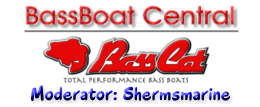You guys are reading way too much into this discussion.
A tire has two functions.
(1) provide traction so that when you turn a corner, the trailer doesn't slide sideways which would result in many wrecks; also prevent the wheels from locking up when the surge brakes are activated.
(2) provide a first-level shock absorber to isolate the trailer and boat from all the road bumps. Here in Alabama, seems like every bridge has a really bad bump on each end where it meets the actual road surface. Some of these are bad enough to rattle your teeth in something with a stiff suspension (say a bass boat with tires at max pressure) or an RV.
Ideal pressure is the minimum pressure required to carry the load you have. Most will increase that by 10% for a margin of error in case you start a little low due to lower air temps. Running at the sidewall max sill result in a stiff/harsh ride, and uneven tread wear (wearing in the center). Won't really damage the tire beyond that, but the harsher ride does travel through the trailer and boat, rather than being reduced/eliminated by the tires and springs/torsion axles. Other rule of thumb is to not go below 75% of the max tire pressure. If your tire has excessive load carrying capacity, going too low results in a lot of sidewall flex which will ramp up temps. Rather than going less than 75% of max, you should be looking at tires with a lower load-carrying capacity. Over-rated tires just increase stress/vibration to everything above them.
Most will have no problem running at max, unless you are doing a lot of traveling (say a pro) making long hauls, rather than a 25 mile run to the local boat ramp. The longer the distance, and the more miles you accumulate, the greater the risk for potential damage / harm. There are lots of places in this world where max is not always best.
I learned all of this on an RV forum where we have a member that has 40 years of experience with RVs and Trailers and is a pure tire specialist. Personally, I use a tire pressure monitoring system both on my RV and on my truck/boat. Have never had a blowout on any vehicle in almost 60 years of driving. Don't plan on starting any time soon. If you do due diligence, you can avoid problems. If you don't/won't, they will find you sooner or later.




 Reply With Quote
Reply With Quote

